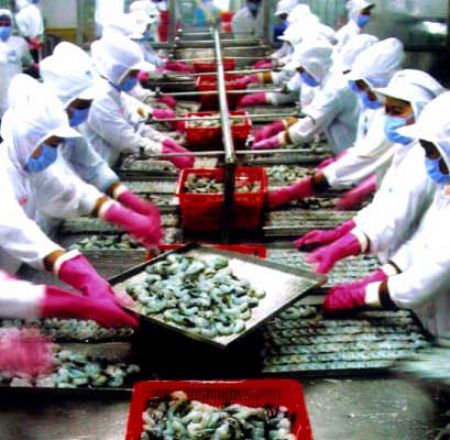
| VASEP proposes to lower import tariff on materials to boost exports | |
The Vietnam Association of Seafood Exporters and Producers (VASEP) has called on the Government to ‘rescue’ the seafood industry by lowering the tariff on material imports for domestic processing. VASEP’s Deputy Chairman Nguyen Huu Dung said that Vietnam needs to import materials in big quantities to feed domestic processing factories. There are some 700 seafood processing factories now in Vietnam, while the domestic sources can provide only 50 percent of the total materials needed. Therefore, Dung said that the Government should lower the tariffs or apply the zero tariff scheme on material imports, the thing that has been applied in other regional countries already.
Dung has proposed the Ministry of Industry and Trade (MOIT) to put forward the tariff reduction on seafood material imports at the National Assembly’s upcoming session, emphasizing that this is the necessary solution to rescue the seafood industry.
VASEP has predicted that the total export revenue of seafood in 2009 will reach 4.2-4.3 billion, a decrease of 5-7 percent over 2008. Meanwhile, MOIT has reported that Vietnam’s has exported USD3 billion worth of seafood products over the last nine months, down by 9.6 percent over the same period of the previous year.
However, the ministry hopes that the exports will be improved in the last months of the year, since the exports to some traditional markets like the EU, Japan and the US tend to increase again. The export revenues to the US (mostly tra and basa fish) were USD530 million, while the revenues to Japan were USD 574 million.
Besides, the door to Japan’s market will be widened when the Vietnam - Japan Economic Partnership Agreement (VJEPA) takes effect on October 1 which imposes low tariffs on Vietnam’s exports to the country. The import tariff of Vietnam’s shrimp will be lowered to 1-2 percent.
Most recently, Spain, the biggest Vietnam’s tra and basa fish consumer in the EU (400,000 tonnes per annum) has recognized that Vietnam’s seafood products can meet the EU’s requirements on food hygiene. | |
| VietNamNet + TP |
